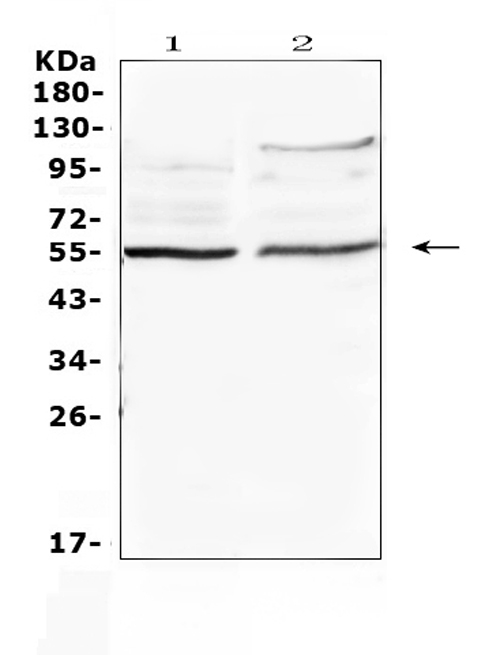Product Info Summary
| SKU: | M00931-1 |
|---|---|
| Size: | 100 μl |
| Reactive Species: | Human, Mouse |
| Host: | Rabbit |
| Application: | Flow Cytometry, WB |
Customers Who Bought This Also Bought
Product info
Product Name
Anti-ETS1 Monoclonal Antibody
SKU/Catalog Number
M00931-1
Size
100 μl
Form
Liquid
Description
Boster Bio Anti-ETS1 Monoclonal Antibody catalog # M00931-1. Tested in WB, Flow Cytometry applications. This antibody reacts with Human, Mouse.
Storage & Handling
Store at -20°C for one year. For short term storage and frequent use, store at 4°C for up to one month. Avoid repeated freeze-thaw cycles.
Cite This Product
Anti-ETS1 Monoclonal Antibody (Boster Biological Technology, Pleasanton CA, USA, Catalog # M00931-1)
Host
Rabbit
Contents
Rabbit IgG in phosphate buffered saline, pH 7.4, 150mM NaCl, 0.02% sodium azide and 50% glycerol, 0.4-0.5mg/ml BSA.
Clonality
Monoclonal
Clone Number
ADAO-5
Isotype
Rabbit IgG
Immunogen
A synthesized peptide derived from human ETS1 Transcription factor.
*Blocking peptide can be purchased. Costs vary based on immunogen length. Contact us for pricing.
Reactive Species
M00931-1 is reactive to ETS1 in Human, Mouse
Reconstitution
Restore with deionized water (or equivalent) for reconstitution volume of 1.0 mL
Observed Molecular Weight
120-150 kDa
Calculated molecular weight
154537 MW
Antibody Validation
Boster validates all antibodies on WB, IHC, ICC, Immunofluorescence, and ELISA with known positive control and negative samples to ensure specificity and high affinity, including thorough antibody incubations.
Application & Images
Applications
M00931-1 is guaranteed for Flow Cytometry, WB Boster Guarantee
Assay Dilutions Recommendation
The recommendations below provide a starting point for assay optimization. The actual working concentration varies and should be decided by the user.
WB 1:500-1:2000
FC 1:80
Positive Control
WB: Daudi cell
Validation Images & Assay Conditions

Click image to see more details
Western blot analysis of Insulin Receptor R expression in Daudi cell lysate.
Protein Target Info & Infographic
Gene/Protein Information For ETS1 (Source: Uniprot.org, NCBI)
Gene Name
ETS1
Full Name
Protein C-ets-1
Weight
154537 MW
Superfamily
ETS family
Alternative Names
Mitogen-activated protein kinase kinase kinase 5;2.7.11.25;Apoptosis signal-regulating kinase 1;ASK-1;MAPK/ERK kinase kinase 5;MEK kinase 5;MEKK 5;MAP3K5;ASK1, MAPKKK5, MEKK5; ETS1 ETS-1, EWSR2, c-ets-1, p54 ETS proto-oncogene 1, transcription factor protein C-ets-1|Avian erythroblastosis virus E26 (v-ets) oncogene homolog-1|v-ets avian erythroblastosis virus E2 oncogene homolog 1|v-ets avian erythroblastosis virus E26 oncogene homolog 1
*If product is indicated to react with multiple species, protein info is based on the gene entry specified above in "Species".For more info on ETS1, check out the ETS1 Infographic

We have 30,000+ of these available, one for each gene! Check them out.
In this infographic, you will see the following information for ETS1: database IDs, superfamily, protein function, synonyms, molecular weight, chromosomal locations, tissues of expression, subcellular locations, post-translational modifications, and related diseases, research areas & pathways. If you want to see more information included, or would like to contribute to it and be acknowledged, please contact [email protected].
Specific Publications For Anti-ETS1 Monoclonal Antibody (M00931-1)
Loading publications
Recommended Resources
Here are featured tools and databases that you might find useful.
- Boster's Pathways Library
- Protein Databases
- Bioscience Research Protocol Resources
- Data Processing & Analysis Software
- Photo Editing Software
- Scientific Literature Resources
- Research Paper Management Tools
- Molecular Biology Software
- Primer Design Tools
- Bioinformatics Tools
- Phylogenetic Tree Analysis
Customer Reviews
Have you used Anti-ETS1 Monoclonal Antibody?
Submit a review and receive an Amazon gift card.
- $30 for a review with an image
0 Reviews For Anti-ETS1 Monoclonal Antibody
Customer Q&As
Have a question?
Find answers in Q&As, reviews.
Can't find your answer?
Submit your question
3 Customer Q&As for Anti-ETS1 Monoclonal Antibody
Question
We are currently using anti-ETS1 Monoclonal antibody M00931-1 for mouse tissue, and we are happy with the WB results. The species of reactivity given in the datasheet says human, mouse. Is it possible that the antibody can work on monkey tissues as well?
J. Rodriguez
Verified customer
Asked: 2019-12-10
Answer
The anti-ETS1 Monoclonal antibody (M00931-1) has not been tested for cross reactivity specifically with monkey tissues, though there is a good chance of cross reactivity. We have an innovator award program that if you test this antibody and show it works in monkey you can get your next antibody for free. Please contact me if I can help you with anything.
Boster Scientific Support
Answered: 2019-12-10
Question
Our lab were happy with the WB result of your anti-ETS1 Monoclonal antibody. However we have been able to see positive staining in lung cytoplasm. using this antibody. Is that expected? Could you tell me where is ETS1 supposed to be expressed?
Verified Customer
Verified customer
Asked: 2018-07-30
Answer
From what I have seen in literature, lung does express ETS1. Generally ETS1 expresses in cytoplasm. Regarding which tissues have ETS1 expression, here are a few articles citing expression in various tissues:
Endometrium, Pubmed ID: 17974005
Erythroleukemia, Pubmed ID: 23186163
Leukemic T-cell, Pubmed ID: 19690332
Lung, Pubmed ID: 15489334
Boster Scientific Support
Answered: 2018-07-30
Question
We have observed staining in human blood. Any tips? Is anti-ETS1 Monoclonal antibody supposed to stain blood positively?
Verified Customer
Verified customer
Asked: 2017-11-03
Answer
From what I have seen in literature blood does express ETS1. From what I have seen in Uniprot.org, ETS1 is expressed in blood, endometrium, lung, leukemic t-cell, erythroleukemia, among other tissues. Regarding which tissues have ETS1 expression, here are a few articles citing expression in various tissues:
Endometrium, Pubmed ID: 17974005
Erythroleukemia, Pubmed ID: 23186163
Leukemic T-cell, Pubmed ID: 19690332
Lung, Pubmed ID: 15489334
Boster Scientific Support
Answered: 2017-11-03





